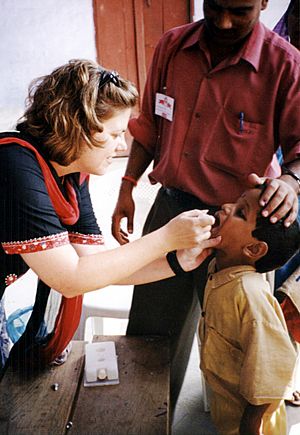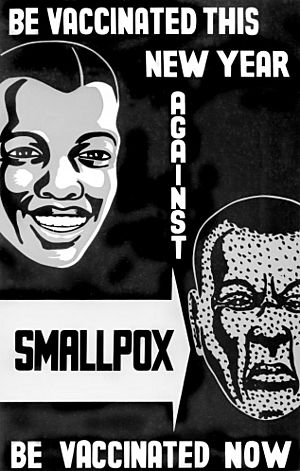Vaccination facts for kids
A vaccination is a special treatment that helps your body become strong against an infection.
Your body fights infections using its immune system. This system is made of many tiny cells, like T cells and B cells. A cool thing about your immune system is that it gets much better at fighting a disease it has already met. Vaccination works by showing your immune system something that looks a lot like a certain virus or bacteria. This helps your immune system get ready and stronger to fight the real infection if it ever comes along.
Contents
Vaccination and Immunization: What's the Difference?
You might hear the words "vaccine" and "immunization". These words are related but mean slightly different things.
- Vaccination is when you get something, like a shot, to teach your immune system how to fight an infectious disease.
- Immunization is when your immune system actually learns to fight an infection.
Immunization can happen because of a vaccination. But it can also happen if you get sick with an infection and then get better. For example, if you get hepatitis B and recover, your body becomes immune to getting it again. You can also become immune to hepatitis B by getting the hepatitis B vaccination.
So, while the words have small differences, people often use "immunization" to mean the same thing as "vaccination."
How Vaccines Protect Everyone: Herd Immunity
Herd immunity is a very important idea that explains how vaccines help a whole group of people. Imagine a group of animals, like a herd. If most of the animals in that group are immune to an infection, they can't get sick. If they don't get sick, they can't spread the disease to others.
This means that even one animal who isn't immune is safer. If no one else in the herd gets the infection, they can't pass it to the one who isn't immune.
This idea works the same way for people. If most people in a community are immune to a disease, the few who are not immune are much safer. They are less likely to be near someone who is infected, so they won't catch the illness.
Some people cannot get vaccines for different reasons. This might include:
- Children who are too sick with other diseases.
- Pregnant women, because some vaccines could harm their baby.
- People with cancer who have a weak immune system.
- Older people whose immune systems are not as strong.
So, when healthy people get vaccinated, it protects them. But it also creates a "shield" for those who cannot get vaccinated. If these vulnerable people are not protected by herd immunity, they can get very sick from infections. That's why it's so important for healthy people to get their vaccinations. It helps protect everyone in the community.
Different Kinds of Vaccines
There are a few main types of vaccines:
- Inactivated vaccines contain parts of viruses or bacteria that have been killed. They can't make you sick, but your immune system still learns to recognize and fight them.
- Attenuated vaccines use live viruses that have been made very weak. These viruses can still grow a little in your body, but very slowly. This gives your immune system an "easy win" to learn how to fight them. However, people with very weak immune systems (like those with AIDS) usually can't get these vaccines.
- Subunit vaccines show your immune system only a tiny piece of a virus or bacteria. This piece is enough for your body to learn to fight the real thing without getting any virus material.
Are Vaccinations Safe?
Today, in many countries, most people are vaccinated. This has made many serious diseases very rare. However, some people worry about possible side effects from vaccinations.
Vaccinations do have some common side effects. These can include:
- Swelling or redness where you got the shot.
- A sore arm.
- A mild fever.
These effects happen because your immune system is starting to work and learn. Very rarely, the immune system might react too strongly. This can cause it to damage other parts of the body.
Some people also believe that vaccines cause other serious problems like autism, brain damage, or diabetes. However, there is no scientific proof for these claims. Almost all doctors and scientists agree that vaccinations do not cause these issues.
Most medical experts and scientists believe that the benefits of avoiding serious diseases are much greater than the very small risks of side effects. Major medical groups worldwide, like the World Health Organization (WHO) and the American Medical Association, strongly support vaccination.
Where Did the Word "Vaccine" Come From?
The word "vaccine" was created by Edward Jenner. It comes from the Latin word vacca, which means "cow".
This is because the first scientific demonstration of a vaccine used a virus that mainly affects cows, called Cowpox. It showed that giving a person the cowpox virus could protect them from a similar, but much more dangerous, virus.
The History of Vaccination
The very first vaccination was for a terrible disease called smallpox. In 1796, an English doctor named Edward Jenner noticed something important. He saw that people who got cowpox (a mild disease from cows) did not get sick from smallpox.
Jenner decided to try an experiment. He took liquid from cowpox sores and scratched it into the skin of a young boy. This was similar to a dangerous method people used back then to try to get smallpox on purpose. They hoped to get a mild case and become immune, but sometimes they got very sick or even died.
Six weeks after giving the boy cowpox, Jenner scratched smallpox into the boy's skin. The boy did not get sick from smallpox! This boy was the first person ever to receive a vaccination.
It took almost 100 years after the smallpox vaccination for the next vaccine to be found. This was for cholera in 1879. Since then, vaccines for 28 different types of diseases have been discovered.
Images for kids
-
In Sweden, polio vaccination started in 1957.
-
Dr Jenner performing his first vaccination on James Phipps, a boy of age 8. 14 May 1796. Painting by Ernest Board (early 20th century)
-
James Gillray's The Cow-Pock—or—the Wonderful Effects of the New Inoculation!, an 1802 caricature of vaccinated patients who feared it would make them sprout cowlike appendages
-
German caricature showing von Behring extracting the serum with a tap.
See also
 In Spanish: Vacunación para niños
In Spanish: Vacunación para niños
 | Chris Smalls |
 | Fred Hampton |
 | Ralph Abernathy |















